Auditing Report: Breach of Audit Principles and Opinion Analysis
VerifiedAdded on 2020/12/26
|9
|2438
|469
Report
AI Summary
This report delves into the core concepts of auditing, examining the systematic and independent examination of accounting records to ensure fair and accurate financial representation. The report is structured around two key questions: the first addresses various scenarios involving breaches of auditing principles, referencing relevant statutes like Section 100(4) of APES 110 concerning confidentiality and Section 290 regarding independence. The second question focuses on different types of audit opinions, including qualified, disclaimer, and adverse opinions, analyzing case studies where these opinions are applicable due to limitations in scope, lack of documentation, or non-compliance with accounting standards. The report provides detailed explanations for each scenario, offering insights into the practical application of auditing standards and the implications of different audit opinions on financial reporting.
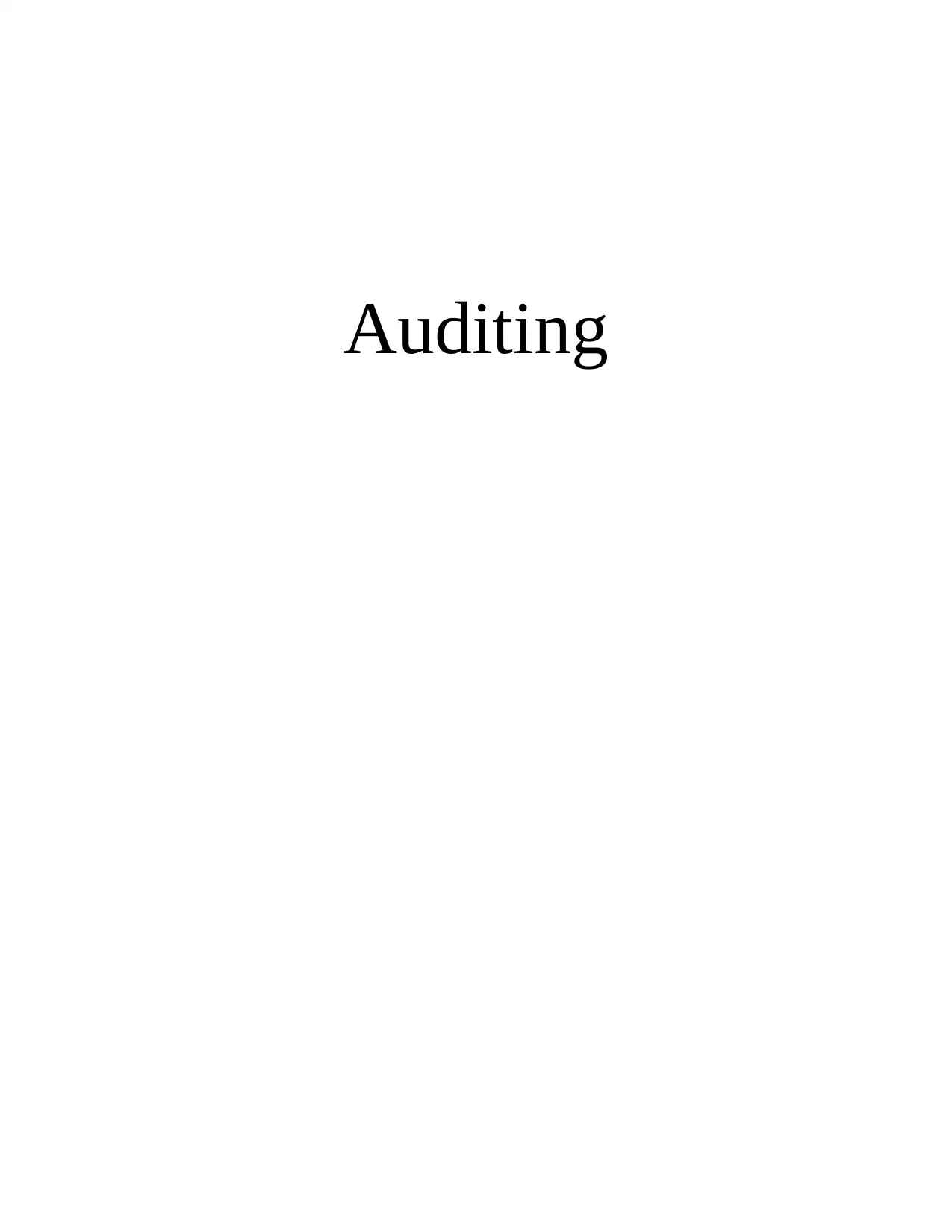
Auditing
Paraphrase This Document
Need a fresh take? Get an instant paraphrase of this document with our AI Paraphraser
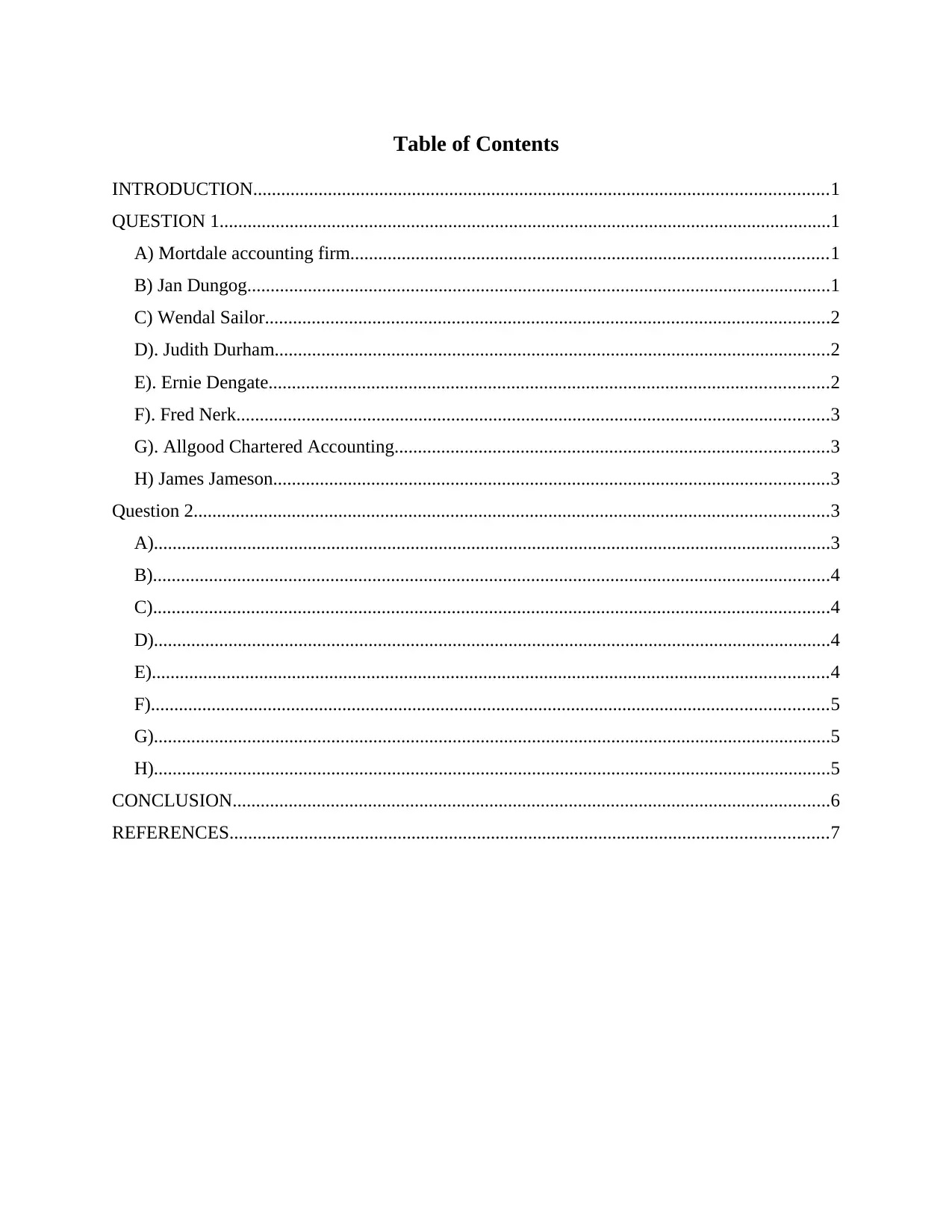
Table of Contents
INTRODUCTION...........................................................................................................................1
QUESTION 1...................................................................................................................................1
A) Mortdale accounting firm......................................................................................................1
B) Jan Dungog.............................................................................................................................1
C) Wendal Sailor.........................................................................................................................2
D). Judith Durham.......................................................................................................................2
E). Ernie Dengate........................................................................................................................2
F). Fred Nerk...............................................................................................................................3
G). Allgood Chartered Accounting.............................................................................................3
H) James Jameson.......................................................................................................................3
Question 2........................................................................................................................................3
A).................................................................................................................................................3
B).................................................................................................................................................4
C).................................................................................................................................................4
D).................................................................................................................................................4
E).................................................................................................................................................4
F).................................................................................................................................................5
G).................................................................................................................................................5
H).................................................................................................................................................5
CONCLUSION................................................................................................................................6
REFERENCES................................................................................................................................7
INTRODUCTION...........................................................................................................................1
QUESTION 1...................................................................................................................................1
A) Mortdale accounting firm......................................................................................................1
B) Jan Dungog.............................................................................................................................1
C) Wendal Sailor.........................................................................................................................2
D). Judith Durham.......................................................................................................................2
E). Ernie Dengate........................................................................................................................2
F). Fred Nerk...............................................................................................................................3
G). Allgood Chartered Accounting.............................................................................................3
H) James Jameson.......................................................................................................................3
Question 2........................................................................................................................................3
A).................................................................................................................................................3
B).................................................................................................................................................4
C).................................................................................................................................................4
D).................................................................................................................................................4
E).................................................................................................................................................4
F).................................................................................................................................................5
G).................................................................................................................................................5
H).................................................................................................................................................5
CONCLUSION................................................................................................................................6
REFERENCES................................................................................................................................7

⊘ This is a preview!⊘
Do you want full access?
Subscribe today to unlock all pages.

Trusted by 1+ million students worldwide
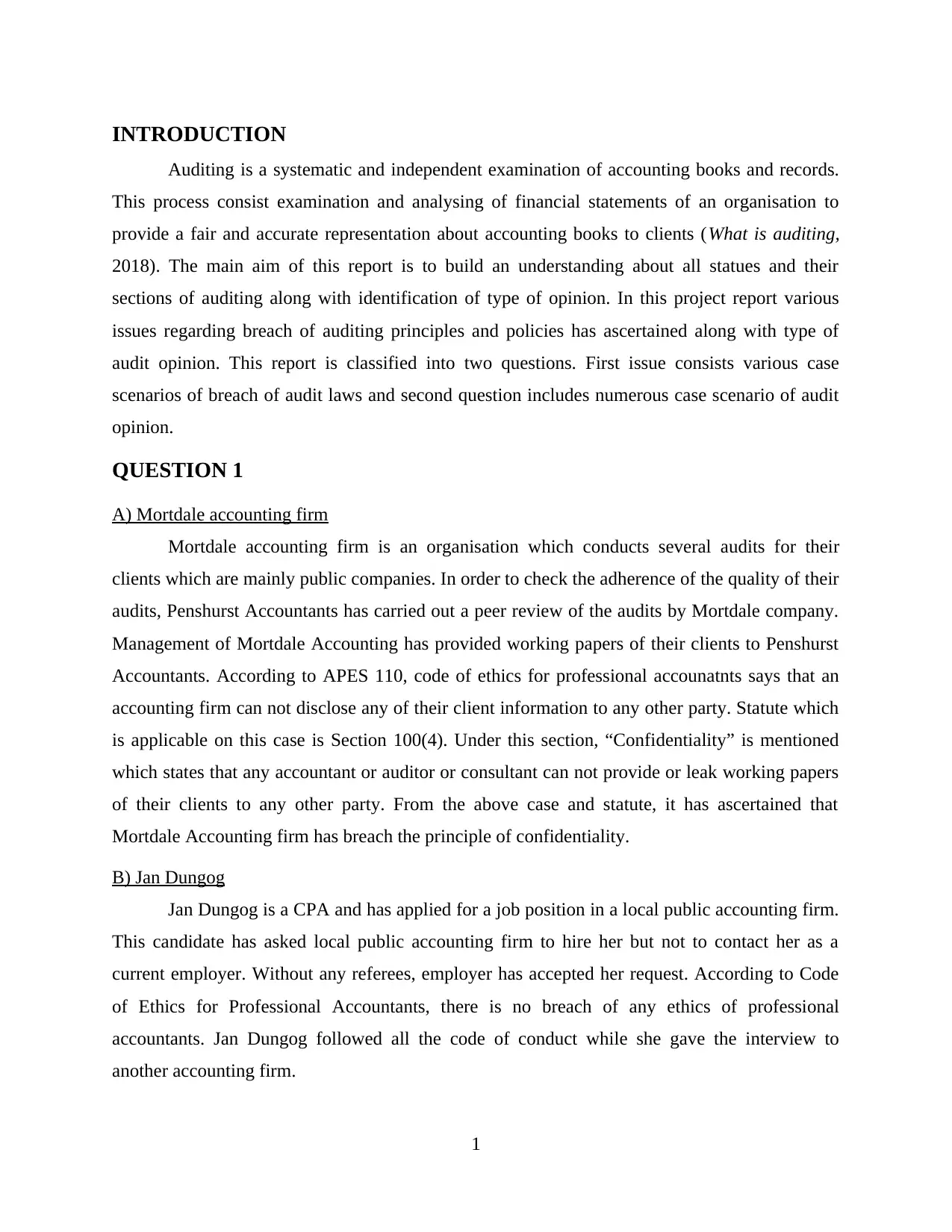
INTRODUCTION
Auditing is a systematic and independent examination of accounting books and records.
This process consist examination and analysing of financial statements of an organisation to
provide a fair and accurate representation about accounting books to clients (What is auditing,
2018). The main aim of this report is to build an understanding about all statues and their
sections of auditing along with identification of type of opinion. In this project report various
issues regarding breach of auditing principles and policies has ascertained along with type of
audit opinion. This report is classified into two questions. First issue consists various case
scenarios of breach of audit laws and second question includes numerous case scenario of audit
opinion.
QUESTION 1
A) Mortdale accounting firm
Mortdale accounting firm is an organisation which conducts several audits for their
clients which are mainly public companies. In order to check the adherence of the quality of their
audits, Penshurst Accountants has carried out a peer review of the audits by Mortdale company.
Management of Mortdale Accounting has provided working papers of their clients to Penshurst
Accountants. According to APES 110, code of ethics for professional accounatnts says that an
accounting firm can not disclose any of their client information to any other party. Statute which
is applicable on this case is Section 100(4). Under this section, “Confidentiality” is mentioned
which states that any accountant or auditor or consultant can not provide or leak working papers
of their clients to any other party. From the above case and statute, it has ascertained that
Mortdale Accounting firm has breach the principle of confidentiality.
B) Jan Dungog
Jan Dungog is a CPA and has applied for a job position in a local public accounting firm.
This candidate has asked local public accounting firm to hire her but not to contact her as a
current employer. Without any referees, employer has accepted her request. According to Code
of Ethics for Professional Accountants, there is no breach of any ethics of professional
accountants. Jan Dungog followed all the code of conduct while she gave the interview to
another accounting firm.
1
Auditing is a systematic and independent examination of accounting books and records.
This process consist examination and analysing of financial statements of an organisation to
provide a fair and accurate representation about accounting books to clients (What is auditing,
2018). The main aim of this report is to build an understanding about all statues and their
sections of auditing along with identification of type of opinion. In this project report various
issues regarding breach of auditing principles and policies has ascertained along with type of
audit opinion. This report is classified into two questions. First issue consists various case
scenarios of breach of audit laws and second question includes numerous case scenario of audit
opinion.
QUESTION 1
A) Mortdale accounting firm
Mortdale accounting firm is an organisation which conducts several audits for their
clients which are mainly public companies. In order to check the adherence of the quality of their
audits, Penshurst Accountants has carried out a peer review of the audits by Mortdale company.
Management of Mortdale Accounting has provided working papers of their clients to Penshurst
Accountants. According to APES 110, code of ethics for professional accounatnts says that an
accounting firm can not disclose any of their client information to any other party. Statute which
is applicable on this case is Section 100(4). Under this section, “Confidentiality” is mentioned
which states that any accountant or auditor or consultant can not provide or leak working papers
of their clients to any other party. From the above case and statute, it has ascertained that
Mortdale Accounting firm has breach the principle of confidentiality.
B) Jan Dungog
Jan Dungog is a CPA and has applied for a job position in a local public accounting firm.
This candidate has asked local public accounting firm to hire her but not to contact her as a
current employer. Without any referees, employer has accepted her request. According to Code
of Ethics for Professional Accountants, there is no breach of any ethics of professional
accountants. Jan Dungog followed all the code of conduct while she gave the interview to
another accounting firm.
1
Paraphrase This Document
Need a fresh take? Get an instant paraphrase of this document with our AI Paraphraser
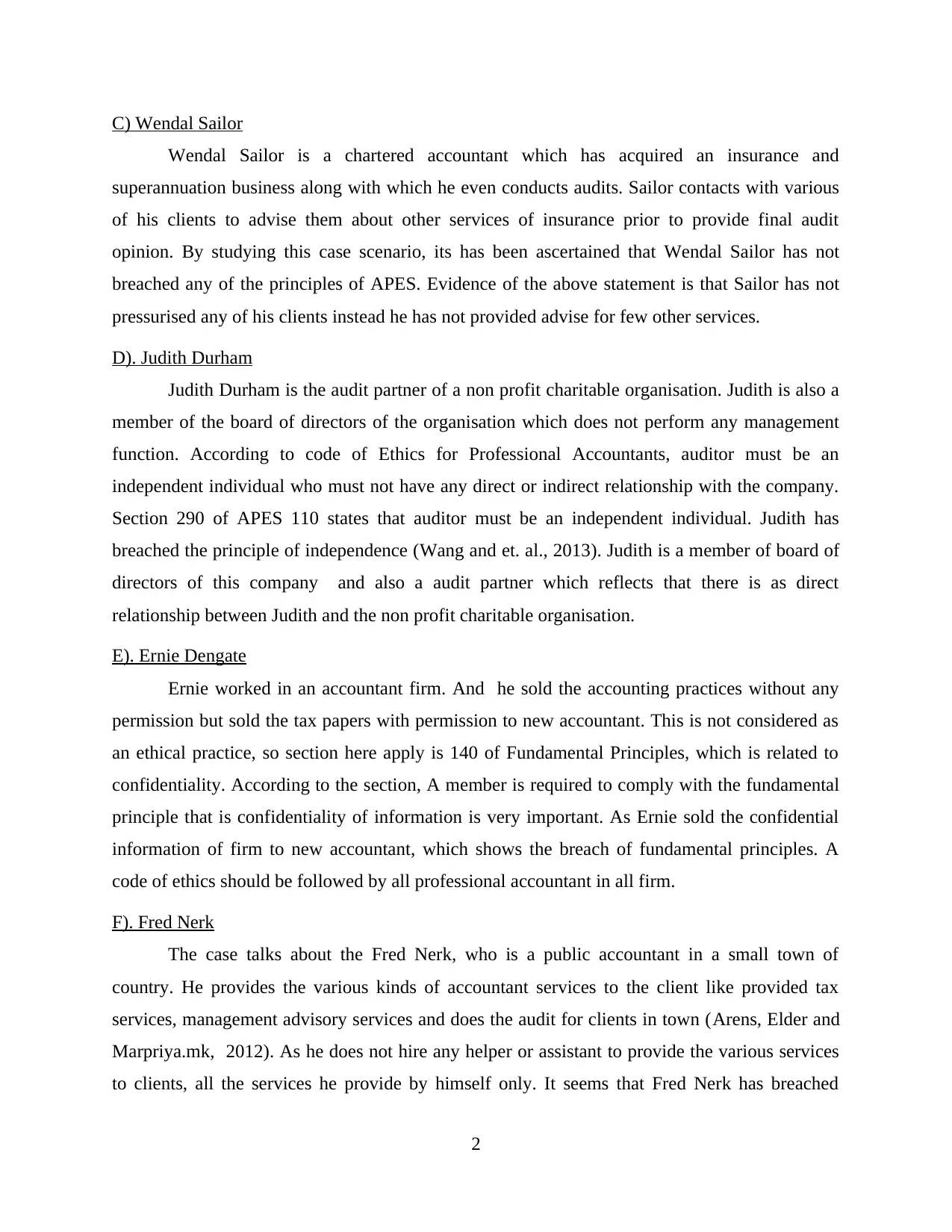
C) Wendal Sailor
Wendal Sailor is a chartered accountant which has acquired an insurance and
superannuation business along with which he even conducts audits. Sailor contacts with various
of his clients to advise them about other services of insurance prior to provide final audit
opinion. By studying this case scenario, its has been ascertained that Wendal Sailor has not
breached any of the principles of APES. Evidence of the above statement is that Sailor has not
pressurised any of his clients instead he has not provided advise for few other services.
D). Judith Durham
Judith Durham is the audit partner of a non profit charitable organisation. Judith is also a
member of the board of directors of the organisation which does not perform any management
function. According to code of Ethics for Professional Accountants, auditor must be an
independent individual who must not have any direct or indirect relationship with the company.
Section 290 of APES 110 states that auditor must be an independent individual. Judith has
breached the principle of independence (Wang and et. al., 2013). Judith is a member of board of
directors of this company and also a audit partner which reflects that there is as direct
relationship between Judith and the non profit charitable organisation.
E). Ernie Dengate
Ernie worked in an accountant firm. And he sold the accounting practices without any
permission but sold the tax papers with permission to new accountant. This is not considered as
an ethical practice, so section here apply is 140 of Fundamental Principles, which is related to
confidentiality. According to the section, A member is required to comply with the fundamental
principle that is confidentiality of information is very important. As Ernie sold the confidential
information of firm to new accountant, which shows the breach of fundamental principles. A
code of ethics should be followed by all professional accountant in all firm.
F). Fred Nerk
The case talks about the Fred Nerk, who is a public accountant in a small town of
country. He provides the various kinds of accountant services to the client like provided tax
services, management advisory services and does the audit for clients in town (Arens, Elder and
Marpriya.mk, 2012). As he does not hire any helper or assistant to provide the various services
to clients, all the services he provide by himself only. It seems that Fred Nerk has breached
2
Wendal Sailor is a chartered accountant which has acquired an insurance and
superannuation business along with which he even conducts audits. Sailor contacts with various
of his clients to advise them about other services of insurance prior to provide final audit
opinion. By studying this case scenario, its has been ascertained that Wendal Sailor has not
breached any of the principles of APES. Evidence of the above statement is that Sailor has not
pressurised any of his clients instead he has not provided advise for few other services.
D). Judith Durham
Judith Durham is the audit partner of a non profit charitable organisation. Judith is also a
member of the board of directors of the organisation which does not perform any management
function. According to code of Ethics for Professional Accountants, auditor must be an
independent individual who must not have any direct or indirect relationship with the company.
Section 290 of APES 110 states that auditor must be an independent individual. Judith has
breached the principle of independence (Wang and et. al., 2013). Judith is a member of board of
directors of this company and also a audit partner which reflects that there is as direct
relationship between Judith and the non profit charitable organisation.
E). Ernie Dengate
Ernie worked in an accountant firm. And he sold the accounting practices without any
permission but sold the tax papers with permission to new accountant. This is not considered as
an ethical practice, so section here apply is 140 of Fundamental Principles, which is related to
confidentiality. According to the section, A member is required to comply with the fundamental
principle that is confidentiality of information is very important. As Ernie sold the confidential
information of firm to new accountant, which shows the breach of fundamental principles. A
code of ethics should be followed by all professional accountant in all firm.
F). Fred Nerk
The case talks about the Fred Nerk, who is a public accountant in a small town of
country. He provides the various kinds of accountant services to the client like provided tax
services, management advisory services and does the audit for clients in town (Arens, Elder and
Marpriya.mk, 2012). As he does not hire any helper or assistant to provide the various services
to clients, all the services he provide by himself only. It seems that Fred Nerk has breached
2
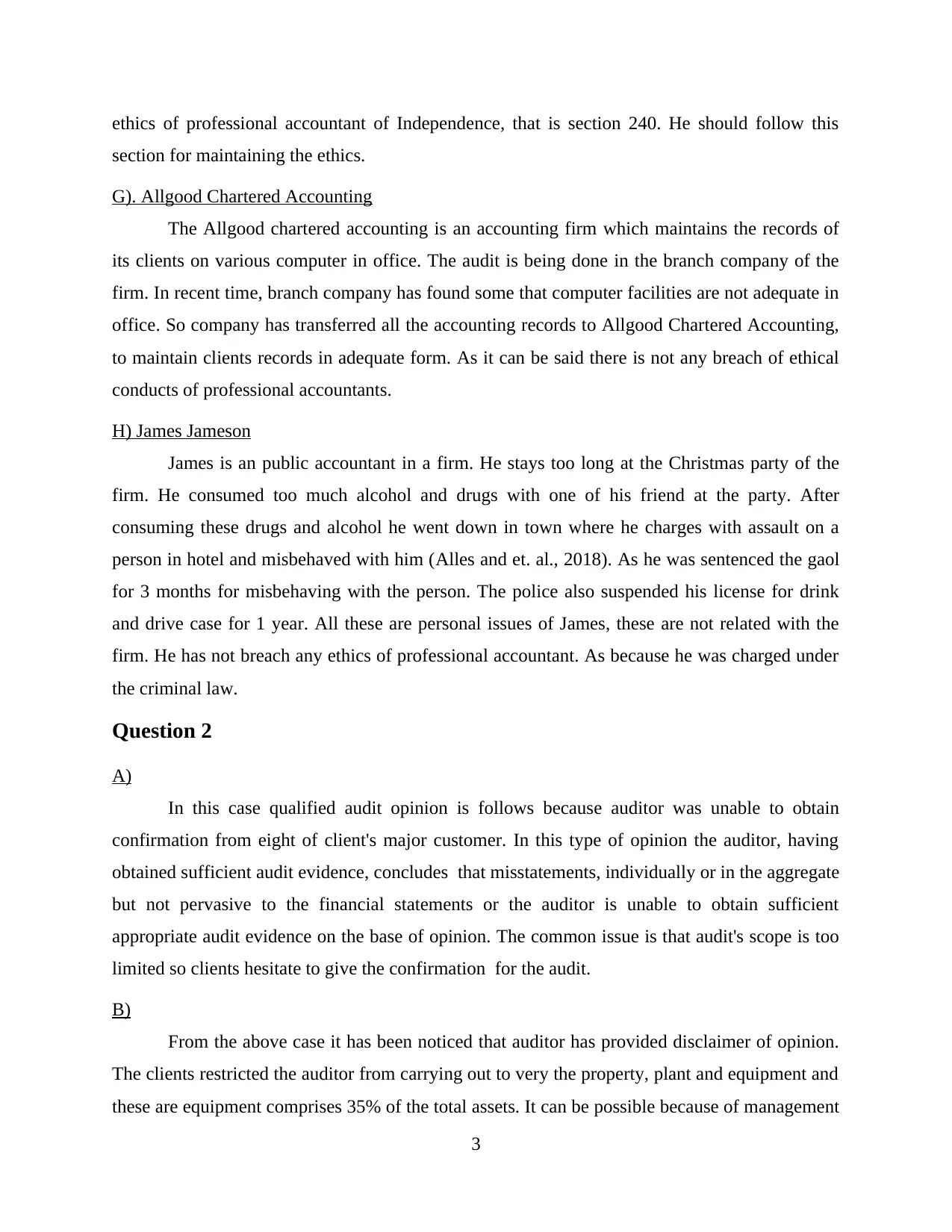
ethics of professional accountant of Independence, that is section 240. He should follow this
section for maintaining the ethics.
G). Allgood Chartered Accounting
The Allgood chartered accounting is an accounting firm which maintains the records of
its clients on various computer in office. The audit is being done in the branch company of the
firm. In recent time, branch company has found some that computer facilities are not adequate in
office. So company has transferred all the accounting records to Allgood Chartered Accounting,
to maintain clients records in adequate form. As it can be said there is not any breach of ethical
conducts of professional accountants.
H) James Jameson
James is an public accountant in a firm. He stays too long at the Christmas party of the
firm. He consumed too much alcohol and drugs with one of his friend at the party. After
consuming these drugs and alcohol he went down in town where he charges with assault on a
person in hotel and misbehaved with him (Alles and et. al., 2018). As he was sentenced the gaol
for 3 months for misbehaving with the person. The police also suspended his license for drink
and drive case for 1 year. All these are personal issues of James, these are not related with the
firm. He has not breach any ethics of professional accountant. As because he was charged under
the criminal law.
Question 2
A)
In this case qualified audit opinion is follows because auditor was unable to obtain
confirmation from eight of client's major customer. In this type of opinion the auditor, having
obtained sufficient audit evidence, concludes that misstatements, individually or in the aggregate
but not pervasive to the financial statements or the auditor is unable to obtain sufficient
appropriate audit evidence on the base of opinion. The common issue is that audit's scope is too
limited so clients hesitate to give the confirmation for the audit.
B)
From the above case it has been noticed that auditor has provided disclaimer of opinion.
The clients restricted the auditor from carrying out to very the property, plant and equipment and
these are equipment comprises 35% of the total assets. It can be possible because of management
3
section for maintaining the ethics.
G). Allgood Chartered Accounting
The Allgood chartered accounting is an accounting firm which maintains the records of
its clients on various computer in office. The audit is being done in the branch company of the
firm. In recent time, branch company has found some that computer facilities are not adequate in
office. So company has transferred all the accounting records to Allgood Chartered Accounting,
to maintain clients records in adequate form. As it can be said there is not any breach of ethical
conducts of professional accountants.
H) James Jameson
James is an public accountant in a firm. He stays too long at the Christmas party of the
firm. He consumed too much alcohol and drugs with one of his friend at the party. After
consuming these drugs and alcohol he went down in town where he charges with assault on a
person in hotel and misbehaved with him (Alles and et. al., 2018). As he was sentenced the gaol
for 3 months for misbehaving with the person. The police also suspended his license for drink
and drive case for 1 year. All these are personal issues of James, these are not related with the
firm. He has not breach any ethics of professional accountant. As because he was charged under
the criminal law.
Question 2
A)
In this case qualified audit opinion is follows because auditor was unable to obtain
confirmation from eight of client's major customer. In this type of opinion the auditor, having
obtained sufficient audit evidence, concludes that misstatements, individually or in the aggregate
but not pervasive to the financial statements or the auditor is unable to obtain sufficient
appropriate audit evidence on the base of opinion. The common issue is that audit's scope is too
limited so clients hesitate to give the confirmation for the audit.
B)
From the above case it has been noticed that auditor has provided disclaimer of opinion.
The clients restricted the auditor from carrying out to very the property, plant and equipment and
these are equipment comprises 35% of the total assets. It can be possible because of management
3
⊘ This is a preview!⊘
Do you want full access?
Subscribe today to unlock all pages.

Trusted by 1+ million students worldwide
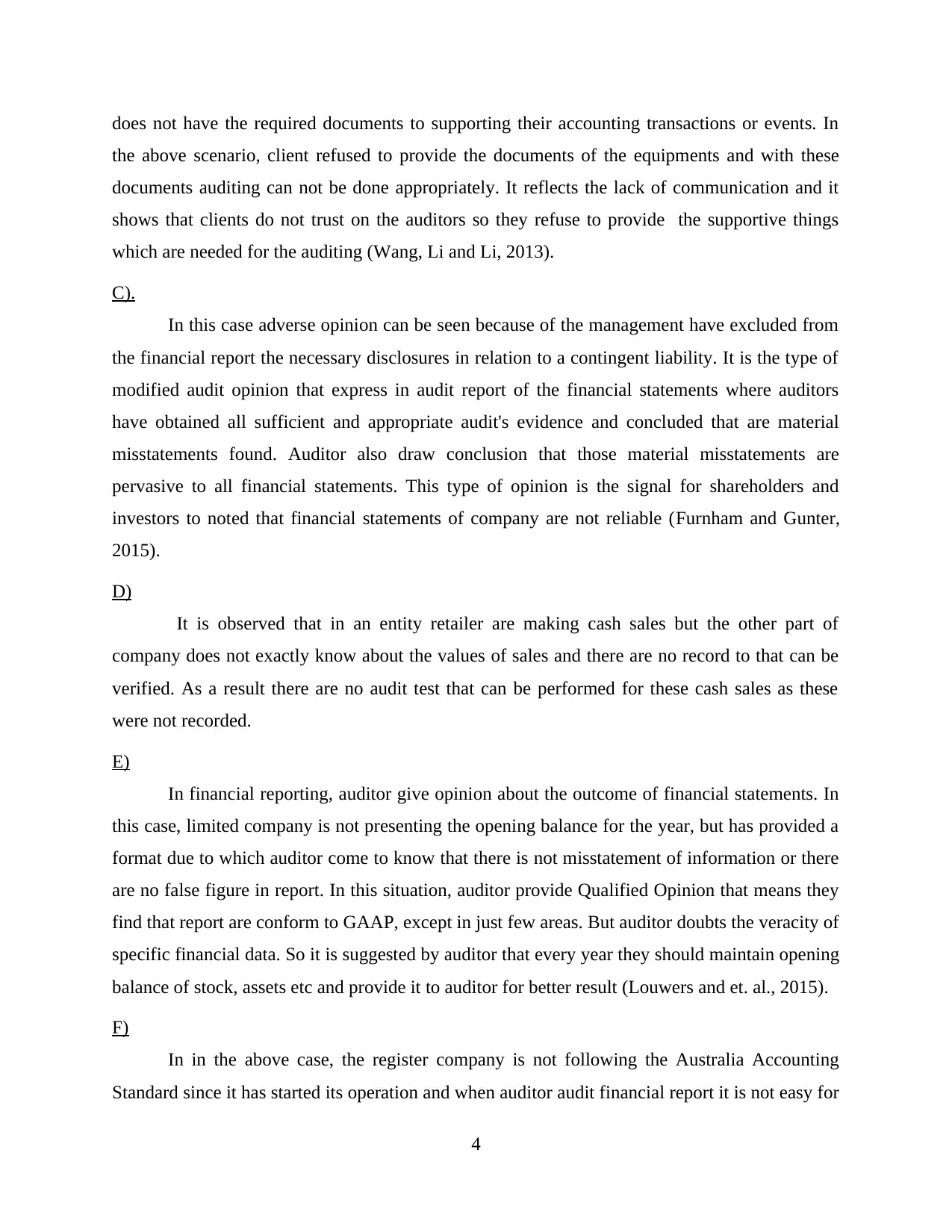
does not have the required documents to supporting their accounting transactions or events. In
the above scenario, client refused to provide the documents of the equipments and with these
documents auditing can not be done appropriately. It reflects the lack of communication and it
shows that clients do not trust on the auditors so they refuse to provide the supportive things
which are needed for the auditing (Wang, Li and Li, 2013).
C).
In this case adverse opinion can be seen because of the management have excluded from
the financial report the necessary disclosures in relation to a contingent liability. It is the type of
modified audit opinion that express in audit report of the financial statements where auditors
have obtained all sufficient and appropriate audit's evidence and concluded that are material
misstatements found. Auditor also draw conclusion that those material misstatements are
pervasive to all financial statements. This type of opinion is the signal for shareholders and
investors to noted that financial statements of company are not reliable (Furnham and Gunter,
2015).
D)
It is observed that in an entity retailer are making cash sales but the other part of
company does not exactly know about the values of sales and there are no record to that can be
verified. As a result there are no audit test that can be performed for these cash sales as these
were not recorded.
E)
In financial reporting, auditor give opinion about the outcome of financial statements. In
this case, limited company is not presenting the opening balance for the year, but has provided a
format due to which auditor come to know that there is not misstatement of information or there
are no false figure in report. In this situation, auditor provide Qualified Opinion that means they
find that report are conform to GAAP, except in just few areas. But auditor doubts the veracity of
specific financial data. So it is suggested by auditor that every year they should maintain opening
balance of stock, assets etc and provide it to auditor for better result (Louwers and et. al., 2015).
F)
In in the above case, the register company is not following the Australia Accounting
Standard since it has started its operation and when auditor audit financial report it is not easy for
4
the above scenario, client refused to provide the documents of the equipments and with these
documents auditing can not be done appropriately. It reflects the lack of communication and it
shows that clients do not trust on the auditors so they refuse to provide the supportive things
which are needed for the auditing (Wang, Li and Li, 2013).
C).
In this case adverse opinion can be seen because of the management have excluded from
the financial report the necessary disclosures in relation to a contingent liability. It is the type of
modified audit opinion that express in audit report of the financial statements where auditors
have obtained all sufficient and appropriate audit's evidence and concluded that are material
misstatements found. Auditor also draw conclusion that those material misstatements are
pervasive to all financial statements. This type of opinion is the signal for shareholders and
investors to noted that financial statements of company are not reliable (Furnham and Gunter,
2015).
D)
It is observed that in an entity retailer are making cash sales but the other part of
company does not exactly know about the values of sales and there are no record to that can be
verified. As a result there are no audit test that can be performed for these cash sales as these
were not recorded.
E)
In financial reporting, auditor give opinion about the outcome of financial statements. In
this case, limited company is not presenting the opening balance for the year, but has provided a
format due to which auditor come to know that there is not misstatement of information or there
are no false figure in report. In this situation, auditor provide Qualified Opinion that means they
find that report are conform to GAAP, except in just few areas. But auditor doubts the veracity of
specific financial data. So it is suggested by auditor that every year they should maintain opening
balance of stock, assets etc and provide it to auditor for better result (Louwers and et. al., 2015).
F)
In in the above case, the register company is not following the Australia Accounting
Standard since it has started its operation and when auditor audit financial report it is not easy for
4
Paraphrase This Document
Need a fresh take? Get an instant paraphrase of this document with our AI Paraphraser
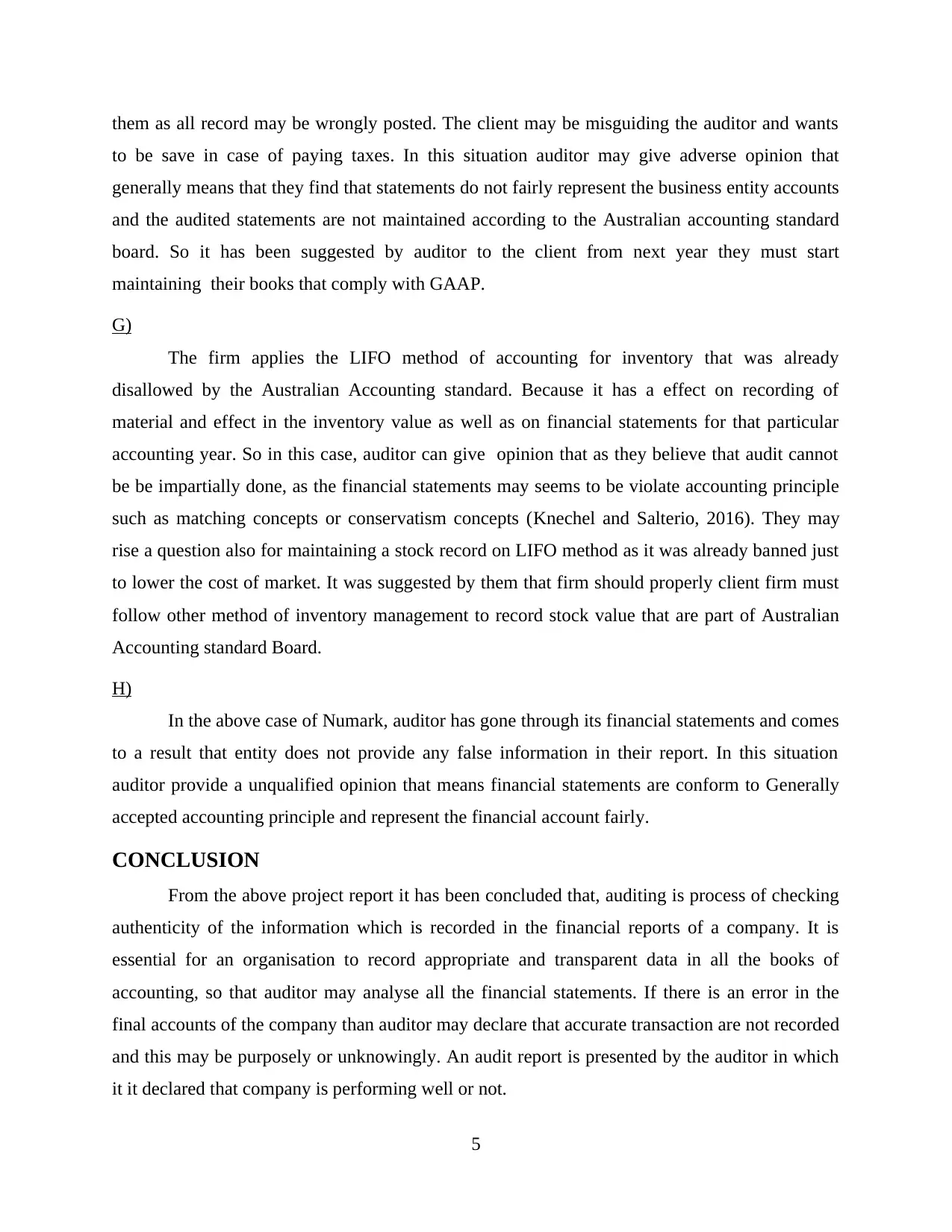
them as all record may be wrongly posted. The client may be misguiding the auditor and wants
to be save in case of paying taxes. In this situation auditor may give adverse opinion that
generally means that they find that statements do not fairly represent the business entity accounts
and the audited statements are not maintained according to the Australian accounting standard
board. So it has been suggested by auditor to the client from next year they must start
maintaining their books that comply with GAAP.
G)
The firm applies the LIFO method of accounting for inventory that was already
disallowed by the Australian Accounting standard. Because it has a effect on recording of
material and effect in the inventory value as well as on financial statements for that particular
accounting year. So in this case, auditor can give opinion that as they believe that audit cannot
be be impartially done, as the financial statements may seems to be violate accounting principle
such as matching concepts or conservatism concepts (Knechel and Salterio, 2016). They may
rise a question also for maintaining a stock record on LIFO method as it was already banned just
to lower the cost of market. It was suggested by them that firm should properly client firm must
follow other method of inventory management to record stock value that are part of Australian
Accounting standard Board.
H)
In the above case of Numark, auditor has gone through its financial statements and comes
to a result that entity does not provide any false information in their report. In this situation
auditor provide a unqualified opinion that means financial statements are conform to Generally
accepted accounting principle and represent the financial account fairly.
CONCLUSION
From the above project report it has been concluded that, auditing is process of checking
authenticity of the information which is recorded in the financial reports of a company. It is
essential for an organisation to record appropriate and transparent data in all the books of
accounting, so that auditor may analyse all the financial statements. If there is an error in the
final accounts of the company than auditor may declare that accurate transaction are not recorded
and this may be purposely or unknowingly. An audit report is presented by the auditor in which
it it declared that company is performing well or not.
5
to be save in case of paying taxes. In this situation auditor may give adverse opinion that
generally means that they find that statements do not fairly represent the business entity accounts
and the audited statements are not maintained according to the Australian accounting standard
board. So it has been suggested by auditor to the client from next year they must start
maintaining their books that comply with GAAP.
G)
The firm applies the LIFO method of accounting for inventory that was already
disallowed by the Australian Accounting standard. Because it has a effect on recording of
material and effect in the inventory value as well as on financial statements for that particular
accounting year. So in this case, auditor can give opinion that as they believe that audit cannot
be be impartially done, as the financial statements may seems to be violate accounting principle
such as matching concepts or conservatism concepts (Knechel and Salterio, 2016). They may
rise a question also for maintaining a stock record on LIFO method as it was already banned just
to lower the cost of market. It was suggested by them that firm should properly client firm must
follow other method of inventory management to record stock value that are part of Australian
Accounting standard Board.
H)
In the above case of Numark, auditor has gone through its financial statements and comes
to a result that entity does not provide any false information in their report. In this situation
auditor provide a unqualified opinion that means financial statements are conform to Generally
accepted accounting principle and represent the financial account fairly.
CONCLUSION
From the above project report it has been concluded that, auditing is process of checking
authenticity of the information which is recorded in the financial reports of a company. It is
essential for an organisation to record appropriate and transparent data in all the books of
accounting, so that auditor may analyse all the financial statements. If there is an error in the
final accounts of the company than auditor may declare that accurate transaction are not recorded
and this may be purposely or unknowingly. An audit report is presented by the auditor in which
it it declared that company is performing well or not.
5
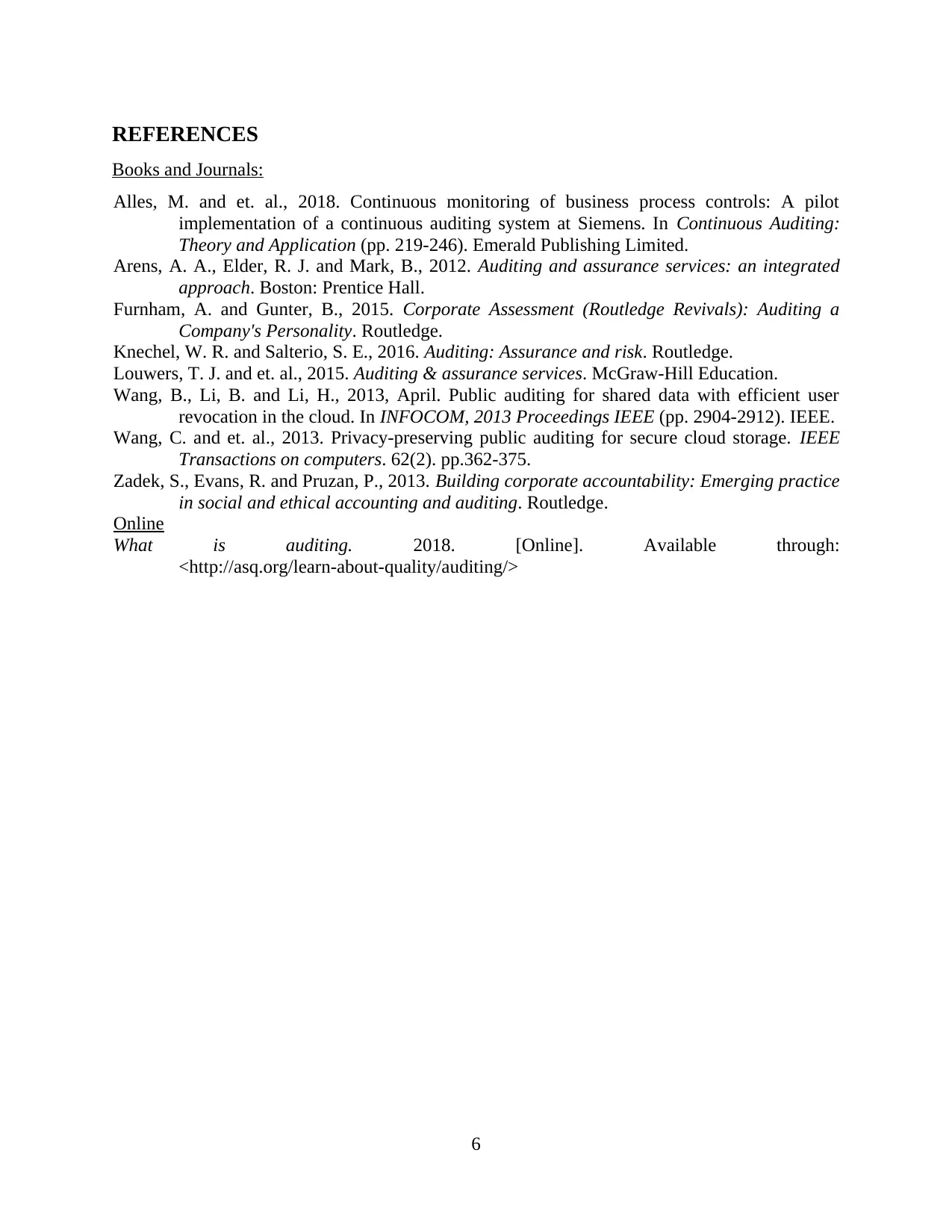
REFERENCES
Books and Journals:
Alles, M. and et. al., 2018. Continuous monitoring of business process controls: A pilot
implementation of a continuous auditing system at Siemens. In Continuous Auditing:
Theory and Application (pp. 219-246). Emerald Publishing Limited.
Arens, A. A., Elder, R. J. and Mark, B., 2012. Auditing and assurance services: an integrated
approach. Boston: Prentice Hall.
Furnham, A. and Gunter, B., 2015. Corporate Assessment (Routledge Revivals): Auditing a
Company's Personality. Routledge.
Knechel, W. R. and Salterio, S. E., 2016. Auditing: Assurance and risk. Routledge.
Louwers, T. J. and et. al., 2015. Auditing & assurance services. McGraw-Hill Education.
Wang, B., Li, B. and Li, H., 2013, April. Public auditing for shared data with efficient user
revocation in the cloud. In INFOCOM, 2013 Proceedings IEEE (pp. 2904-2912). IEEE.
Wang, C. and et. al., 2013. Privacy-preserving public auditing for secure cloud storage. IEEE
Transactions on computers. 62(2). pp.362-375.
Zadek, S., Evans, R. and Pruzan, P., 2013. Building corporate accountability: Emerging practice
in social and ethical accounting and auditing. Routledge.
Online
What is auditing. 2018. [Online]. Available through:
<http://asq.org/learn-about-quality/auditing/>
6
Books and Journals:
Alles, M. and et. al., 2018. Continuous monitoring of business process controls: A pilot
implementation of a continuous auditing system at Siemens. In Continuous Auditing:
Theory and Application (pp. 219-246). Emerald Publishing Limited.
Arens, A. A., Elder, R. J. and Mark, B., 2012. Auditing and assurance services: an integrated
approach. Boston: Prentice Hall.
Furnham, A. and Gunter, B., 2015. Corporate Assessment (Routledge Revivals): Auditing a
Company's Personality. Routledge.
Knechel, W. R. and Salterio, S. E., 2016. Auditing: Assurance and risk. Routledge.
Louwers, T. J. and et. al., 2015. Auditing & assurance services. McGraw-Hill Education.
Wang, B., Li, B. and Li, H., 2013, April. Public auditing for shared data with efficient user
revocation in the cloud. In INFOCOM, 2013 Proceedings IEEE (pp. 2904-2912). IEEE.
Wang, C. and et. al., 2013. Privacy-preserving public auditing for secure cloud storage. IEEE
Transactions on computers. 62(2). pp.362-375.
Zadek, S., Evans, R. and Pruzan, P., 2013. Building corporate accountability: Emerging practice
in social and ethical accounting and auditing. Routledge.
Online
What is auditing. 2018. [Online]. Available through:
<http://asq.org/learn-about-quality/auditing/>
6
⊘ This is a preview!⊘
Do you want full access?
Subscribe today to unlock all pages.

Trusted by 1+ million students worldwide
1 out of 9
Related Documents
Your All-in-One AI-Powered Toolkit for Academic Success.
+13062052269
info@desklib.com
Available 24*7 on WhatsApp / Email
![[object Object]](/_next/static/media/star-bottom.7253800d.svg)
Unlock your academic potential
Copyright © 2020–2026 A2Z Services. All Rights Reserved. Developed and managed by ZUCOL.





